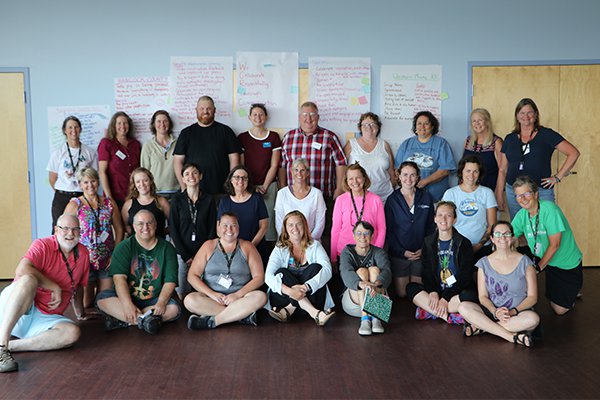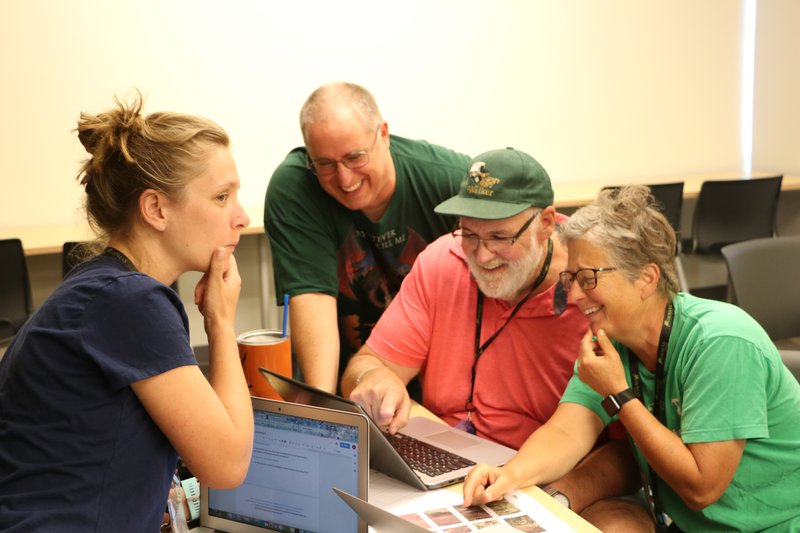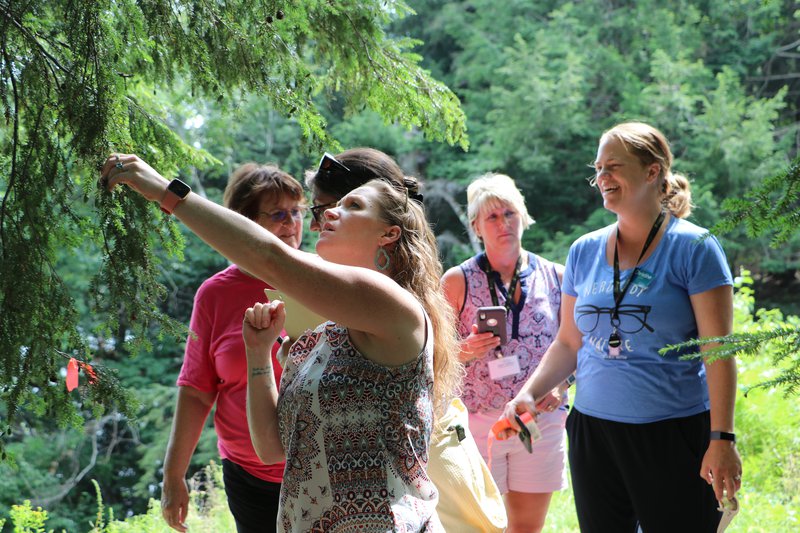Connected Learning Ecosystems (CLEs)
What are CLEs?
CLEs are peer communities of formal and informal educators and learning experience designers across the Northeast who are working together to support STEM teaching and learning, and to build a climate literate generation. They connect regularly, both online and in person, to learn with and from one another in order to increase comfort and confidence around climate change topics in both youth and adults. CLE members work together to engage youth in place-based, locally relevant investigations of ecosystems and climate change that are connected across formal and informal learning spaces.
CLE Goals:
- Work together to build a climate and data literate generation founded on strong STEM skills that will serve youth across their lifespans.
- Increase comfort and ability of educators (classroom, museum, 4-H, library, land trust, etc.) to provide meaningful STEM learning experiences for youth.
- Provide opportunities in different learning contexts for youth to experience and succeed in STEM.
- Connect learning across the boundary between in and out-of-school, and increase the places and pathways where youth learn.
- Build and expand on phenomena-based experiences for youth that are connected to local and regional climate impacts.
- Support local leadership, and promote community ownership.
An Educator's Perspective
My participation in the Hancock/Midcoast Connected Learning Ecosystem (CLE) provided a sustaining focus for me this year as I made plans for authentic inquiry for my students in the spring. I engaged with colleagues that I’ve never met to hear what their aspirations and plans involved and how we can collectively support one another and develop as professionals with the help of the cohort; specifically to network to share and access resources and to broaden our thinking and problem-solving to achieve our conceptions of what authentic inquiry can look like for students.
...
For me, the CLE has been a validation of the effort it takes to teach through authentic inquiry projects. I greatly appreciate the funding of everything from subs, mileage, equipment money and grant funding that all enhanced what I was able to do for my students. The CLE has also been a supportive audience indirectly for the student work and for me directly as an educator. It is important that we educators renew ourselves through collegial dialogues and celebrations as they motivate and sustain us, and the CLE filled that role too.
It is easy to become isolated without a structure like an CLE, especially for small schools and small districts. It’s important to organize regionally, as that is the most practical structure beyond our schools and districts. The facilitators of the CLE have been EXCELLENT and I feel fortunate to continue with the Hancock/Midcoast CLE. Thank you for a thoughtful and productive year of support.

Our guiding vision is to support the growth of STEM education in the state of Maine by bringing educators together in CLEs, where they can learn from and support one another by sharing resources, ideas, and experiences. Since launching in 2016, we’ve grown and sustained educator communities in six regions:
Maine:
New York:
We will continue to grow and expand CLEs throughout the Northeast. Anyone interested in joining or starting a CLE can email Molly Auclair or visit Learning Ecosystems Northeast.
Each CLE is co-led by two local lead educators. Throughout the year, there are multiple opportunities for these adults working directly with youth to collaborate and build capacity to engage learners in connected learning experiences. Whether through in-person meet-ups after school, virtual get-togethers, seasonal engagement events, or bi-annual statewide gatherings, CLE members have multiple opportunities to learn and share better educational practices, resources, and ideas with peers. These touch points also allow for CLE members to engage in ongoing reflections about how to enhance learning experiences in all their contexts while co-creating and imagining the multiple pathways for youth to develop self efficacy and identity in STEM.



"I have found meeting with local science educators to be inspiring and everyone is very encouraging. I have been teaching for over 30 years and these meetings are almost always more beneficial than regular workshops or other professional development training I have had. As a co-leader, I have received training and co-leaders are always given the support we need.
Kelly Robbins Medomak Middle School Teacher
We seek to ensure that CLEs persist through time, because developing better STEM education practices is inherently a long-term effort. Needs will change, as will our understanding of best teaching and learning practices. Linking and supporting networks of confident and competent adults will foster the exchange of STEM professional development opportunities, educational resources, and best practices and thus increase local capacity to respond to changing educational needs and build a climate literate generation.
Staff Contact
Read More
-
![Learning Ecosystems Northeast (LENE): All Systems Go]()
Learning Ecosystems Northeast (LENE): All Systems Go
LENE is a network of peer communities where educators in local regions join forces, committed to empowering the next generation of climate stewards.
Announcements
-
![The Value of Community Science]()
The Value of Community Science
We learn from experts about community science — scientific research and monitoring driven and controlled by local communities — and what makes it such an …
Perspectives
-
![Recognizing Top Teachers]()
Recognizing Top Teachers
We are connected to so many amazing educators doing great work around the state, and we love recognizing them when we get the chance. This …
Announcements
-
![Teachers, Students Engaging in Citizen Science]()
Teachers, Students Engaging in Citizen Science
Whether in our lab, in the classroom, or out in the field, our Education team is working with students and teachers around the state to …
Perspectives



